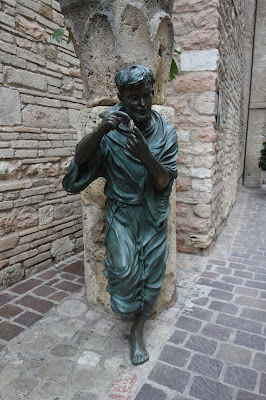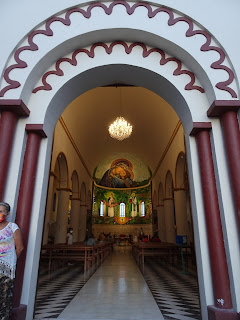A homiletic dilema
I’m trying to write next Sunday’s sermon. I need help.
The readings are way too critical of privilege and of wealth, and of a privileged class instead of a prophetic people.
"Come now, you rich, weep and wail over your impending miseries." (James 5:1)
"Teacher, we saw someone driving out demons in your name, and we tried to prevent him because he does not follow us.” Jesus replied, “Do not prevent him. There is no one who performs a mighty deed in my name who can at the same time speak ill of me. For whoever is not against us is for us." (Mark 9: 38-40)
It looks as if the choices are between castigating wealth and condemning clericalism.
If I were in the US, I would probably defer to James and get into a lot of trouble.
Here’s what I wrote seven years ago.
James is way too bold:
Accumulating wealth? “Come now, you rich, weep and wail over your impending miseries. Your wealth has rotted away…”
Not paying a living wage? “…the wages you withheld from the workers who harvested your fields are crying aloud.”
Living a luxurious lifestyle? “You have lived on earth in luxury and pleasure.”
Ouch.
Then I remembered a blog I had written seven years ago that noted the challenge of this passage from James.
But there are challenges in the other readings.
If I were preaching to a group of priests or deacons, I’d probably concentrate on Numbers and the first part of the Gospel. These are clear critiques of trying to monopolize the gifts of prophecy. They castigate any form of clericalism, of privilege, of presuming one’s superiority, of thinking we have the answers or a privileged access to the message of God.
That would probably also get me into trouble, because, I believe, clericalism is way too deeply engrained among us clergy. (I wrote
something on this a few years ago.)
But I’ll be preaching to the poor, here in Honduras.
What do I want to say to them?
I want to cry out: “Would that all the people of the Lord were prophets!”
All too often the poor here defer to the powerful, the educated, the “authorities,” whether in the church or public life.
The “powers that be” try to mute the voices of the poor, sometimes in violent ways by repressing demonstrations as well as defenders of creation and the rights of the poor. Sometimes their voices are not even heard.
And all too often I have heard the poor put down – not just by educated elites or political bosses, but even by progressive clergy.
But how can we let the people of the Lord speak out forthrightly? How can we open the path so that all the people of the Lord can be prophets?
I am rather perturbed when preachers emphasize the sinfulness of the people sitting before them.
Yes, there is sin – and it abounds. The domestic abuse and violence, the resentment and vengeance that sometimes result in murder, the machismo which puts down women – these are real evils.
But there are also the real evils of the impoverishment of people, of corrupt politicians manipulating the poor for their benefit, of structures of injustice and impunity that leave the poor without recourse to justice, of systemic use of violence and repression by political and economic elites.
Yet, in the midst of this, there are signs of grace.
There’s the young man I know who decided on his own to try to raise money for a young man in aa neighboring village who seriously injured in a motorcycle accident.
There are the families which care for the sick elderly in their homes and the single mothers who care for children and adults with special needs.
And there are those who welcome the marginalized in their midst.
I’m working with people in the countryside to try to find ways to prepare for natural disasters, like the two hurricanes we had last year. Today, someone shared how, in his village, the young people came to help the people who were displaced from their houses and sought shelter in the hall of the local church. He noted, with some satisfaction, that even some young drug-addicts came and helped.
There are more signs of grace – and there are signs of great wisdom, but all too often, who listens?
In my preaching I want to open those who are listening to the great work that God is doing in their midst, and in their lives.
At times, I will recall the obstacles to God that we find around us and even within ourselves. It is important to remember that the name Satan means the adversary, the one who opposes.
But how can we open a way for the people to know and share the gift of prophetic wisdom that is part of our baptismal heritage?
Walter Brueggemann, in
The Practice of Prophetic Imagination, writes:
Prophetic preaching is an effort to imagine the world as though YHWH, the creator of heaven and earth, the Father of our Lord Jesus Christ whom we name as Father, Son, and Spirit, is a real character and the defining agent in the world.
God is working among us – and the poor are God’s messengers. But at times our imagination is suppressed and we find it all too hard to see the working of God in our midst.
May they and I find ways to recognize this and open a space where God can work in us, among us, and through us.
What a task!
























